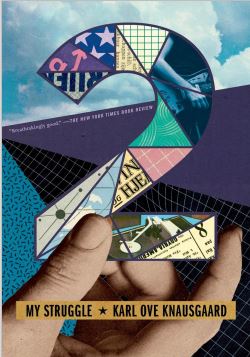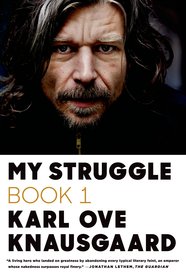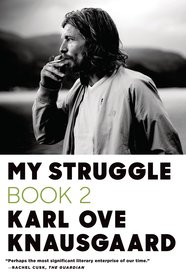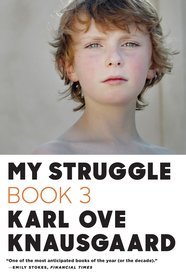the
Literary Saloon
the literary
weblog
at the
complete review
the weblog
about the saloon
support the site
archive
Arts Journal
Books, Inq.
BookRiot
Bookslut
BritLitBlogs
Con/Reading
Critical Mass
GalleyCat
Guardian Unlimited
Jacket Copy
The Millions
MobyLives
NewPages Weblog
Omnivoracious
Page-Turner
PowellsBooks.Blog
Three Percent
Typographical Era
Moleskine
Papeles perdidos
Perlentaucher
Rép. des livres
Arts & Letters Daily
Arts Beat/Books
Bookdwarf
Brandywine Books
Buzzwords
Collected Miscellany
Light Reading
The Millions
The Page
ReadySteady Blog
The Rumpus
Two Words
Waggish
wood s lot
See also: links page
saloon statistics

opinionated commentary on literary matters - from the complete review
The
Literary Saloon
Archive
11 - 20 April 2014
11 April: Guggenheim fellowships | Writing from ... (North) Korea | Mansoura Ez-Eldin Q & A
12 April: Kamila Shamsie profile | Up and coming, out of Russia ? | How's the Pain ? review
13 April: Svenska Akademiens nordiska pris | Writing in ... Norway | Ozick on Reiner Stach on Kafka | LA Times Book Prize winners
14 April: Knausgaard coverage | New Swedish Book Review | Why I Killed My Best Friend review
15 April: Best Translated Book Award shortlist | Pulitzer Prizes
16 April: New Asymptote | Best Translated Book Awards - poetry finalists | Don Bartlett Q & A
17 April: Reading Kundera in Central Europe | Fiona McCrae Q & A | 124 entries for Nigeria Prize for Literature
18 April: Gabriel García Márquez (1927-2014) | Göran Malmqvist profile
19 April: New Murakami (in Japan) | Turkish fiction | Peter Buwalda Q & A | In the Light of What We Know review
20 April: Kunderian unbearability | (Mis)translation into Korean
go to weblog
return to main archive
Kunderian unbearability | (Mis)translation into Korean
Kunderian unbearability
At Words without Borders' Dispatches weblog Sean Cotter considers The Un-X-able Y-ness of Z-ing (Q): A List with Notes, riffing on how (variations on) the famous Kunderian title have taken hold.
Among the interesting titbits:The piece is from: The Man Between: The Life and Legacy of Michael Heim, Translator forthcoming from Open Letter Books; pre-order your copy at Amazon.com or Amazon.co.uk.
- Kundera's "book was not published in the Czech Republic until 2006"
- "We might expect the presence of "the unbearable lightness of" to boom with the publication of the translated novel (1984) and the popularity of the movie (1988) and to wane as years pass. The opposite, however, is the case: through 2000, the frequency of "the unbearable lightness of" is rising."
(Posted by: M.A.Orthofer) - permanent link -
(Mis)translation into Korean
In The Korean Times Yun Suh-young reports on Lost in translation: New book explores mistranslation in Korean literature.
I'd love to see more studies on mistranslation ! Though, of course, it's really just a matter of perspective, isn't it ? All translation is mistranslation, and it's just a matter of whether your focus is on the miss or the translation, so to speak.
Still, interesting that, for example:In Korea, writer Ahn Jung-hyo, was one of the first movers in translating his Korean work into English on his own. The English works of Ahn are significantly different from the Korean version because in writing the Korean novel into English, he freely translated, added and re-wrote some parts into the foreign language.(Not really the kind of thing I want to hear, I have to say.)
(Posted by: M.A.Orthofer) - permanent link -
New Murakami (in Japan) | Turkish fiction | Peter Buwalda Q & A
In the Light of What We Know review
New Murakami (in Japan)
A new volume of stories by Murakami Haruki is out in Japan, 女のいない男たち; see the 文藝春秋 publicity page.
See, for example, The Japan Times report, Murakami's new book hits shelves amid fan frenzy; more ordered, as:Publisher Bungei Shunju has already raised the first shipment of the book to 300,000 copies from 200,000 due to heavier-than-expected advance orders for the first compilation since 2005, local media said.You figure they'd have this figured out by now; I assume they just low-ball what they say the initial print run is so that they can report the 'heavier-than-expected' demand ..... (Of course, since this the publishing industry it's distinctly possible that they have nothing figured out .....)
(Posted by: M.A.Orthofer) - permanent link -
Turkish fiction
In Daily Sabah Kaya Genç considers Turkish Masterpieces Unread by the World -- both some available in translation and some that have yet to make it into English.
Maureen Freely weighs in with some suggestions:So which Turkish authors would she like to see in English ? The first name that came to her mind was Sevgi Soysal. Freely had translated Soysal's Yıldırım Bölge Kadınlar Koğuşu in her twenties but said it had been impossible to place Turkish writing in English publishing houses in those days. "The book of hers I really love is Şafak," Freely wrote. "And I also wish that somebody could bring the best of Murathan Mungan into English."See also the Turkish fiction under review at the complete review.
(Posted by: M.A.Orthofer) - permanent link -
Peter Buwalda Q & A
This week's Small Talk-column in the Financial Times has a Q & A with Peter Buwalda, whose Bonita Avenue is just out from Pushkin Press; see their publicity page and the Dutch Foundation for Literature information page, or get your copy at Amazon.com or Amazon.co.uk.
I'm won over by this response:Which book changed your life ?Damn, that warms the heart.
The Darkroom of Damocles by Willem Frederik Hermans, one of the great 20th-century Dutch writers. It's a novel about resistance in the second world war but also about personal failure. I read the book when I was 18. I stopped studying physics immediately and started studying literature.
(Posted by: M.A.Orthofer) - permanent link -
In the Light of What We Know review
The most recent addition to the complete review is my review of Zia Haider Rahman's In the Light of What We Know -- apparently one of this year's 'big' debuts.
(Posted by: M.A.Orthofer) - permanent link -
Gabriel García Márquez (1927-2014) | Göran Malmqvist profile
Gabriel García Márquez (1927-2014)
The 1982 Nobel laureate, Gabriel García Márquez, has passed away.
Only two of his titles are under review at the complete review (I read pretty much all the rest before I started the site): One Hundred Years of Solitude still seems to me the most significant novel of the past fifty years; get your copy -- if, incomprehensibly, you don't have one -- at Amazon.com or Amazon.co.uk.
There has been extensive coverage (and much, much more will follow, no doubt); see, for example:But there's tons more -- especially in the Spanish-language press.
- Gabriel García Márquez obituary by Nick Caistor at The Guardian
- Gabriel García Márquez, Nobel laureate writer, dies aged 87 by Richard Lea and Jo Tuckman in The Guardian
- Gabriel García Márquez, Conjurer of Literary Magic, Dies at 87 by Jonathan Kandell in The New York Times
- Entwining Tales of Time, Memory and Love, 'an appraisal' by Michiko Kakutani in The New York Times
- Gabriel García Márquez: He proved that tall tales could be truer than facts by Gaby Wood in The Telegraph
- Gabriel García Márquez, Nobel Prize-winning explorer of myth and reality, dies at 87 by Marcela Valdes in The Washington Post
(Posted by: M.A.Orthofer) - permanent link -
Göran Malmqvist profile
In the South China Morning Post Janice Leung invites readers to Meet Göran Malmqvist, Nobel Prize member and champion of Chinese literature -- the Chinese-speaking member of the Swedish Academy.
The big news here is Malmqvist claiming of Border Town-author Shen Congwen that:If he hadn't passed away, he would have got the Nobel Prize in 1988Stop the presses ?!??
Was the 1988 laureate -- Naguib Mahfouz -- really second choice ?
Well, not so fast -- Shen passed away in May of 1988; he may well have been one of the (usually five) finalists by then, but they don't settle on a winner until the fall, so there's no way of telling whether he would have prevailed over Mahfouz. Still, interesting to hear he was so close.
Also of interest: Malmqvist's complaints:Unfortunately, he says, there are as many poor translators as there are good writers in China.One exception:
"What makes me angry, really angry," he cries, eyes blazing, "is when an excellent piece of Chinese literature is badly translated. It's better not to translate it than have it badly translated. That is an unforgivable offence to any author. It should be stopped.
"Often translations are done by incompetent translators who happen to know English, or German, or French. But a lot of them have no interest and no competence in literature. That is a great pity."David Hawkes' rendition of Cao Xueqin's epic novel The Story of the Stone, which he regards as a rare gem of translated Chinese literature.
(Posted by: M.A.Orthofer) - permanent link -
Reading Kundera in Central Europe | Fiona McCrae Q & A
124 entries for Nigeria Prize for Literature
Reading Kundera in Central Europe
At Eurozine they reprint a piece by Jonathan Bousfield from New Eastern Europe, Growing up in Kundera's Central Europe, in which he discusses how Milan Kundera's concept of Central Europe (and his writing) influenced three writers from the area -- from Czechoslovakia (Tomáš Zmeškal, "of mixed Czech and Congolese descent"), Yugoslavia (Miljenko Jergović, several of whose works have been translated into English), and the Soviet Union/Ukraine (The Moscoviad-author Yuri Andrukhovych) -- three countries that no longer have the same contours as they did when these authors were growing up, or even after the collapse of the Soviet Union.
(Posted by: M.A.Orthofer) - permanent link -
Fiona McCrae Q & A
At Guernica Jonathan Lee has a Q & A with Graywolf Press-publisher Fiona McCrae, The Art of Independent Publishing.
She worked at Faber during interesting times, too, and describes the pleasant surprise that was the success of Per Petterson's Out Stealing Horses.
(Posted by: M.A.Orthofer) - permanent link -
124 entries for Nigeria Prize for Literature
The closing date for entries for this year's Nigeria Prize for Literature was 31 March, and they've now announced (though not yet at the official site ...) that there were 124 entries; see, for example, the This Day report.
The prize rotates through four genres, and this year it's drama; the winner will receive US $100,000.
To "encourage literary criticism" there's also a literary criticism prize, "open to literary critics from all over the world" (as long as the criticism is of Nigerian literature). Here the prize-sum is given in the local currency -- presumably since 1,000,000 naira sounds more impressive than its US dollar equivalent (less than $6200).
(Posted by: M.A.Orthofer) - permanent link -
New Asymptote | Best Translated Book Awards - poetry finalists
Don Bartlett Q & A
New Asymptote
The April issue of Asymptote is now out -- and worth your while, top to bottom. Nevertheless, a few of the highlights:But don't overlook the rest, either !
- The Artist on her Trapeze: Barbara Wright's 99 Variations on a Theme by Raymond Queneau by David Bellos, on her translation of Raymond Queneau's classic Exercises in Style -- a piece apparently taken from Dalkey Archive Press' Barbara Wright: Translation as Art (see their publicity page, or get your copy at Amazon.com or Amazon.co.uk), a book I regretably haven't seen yet (but now have on reserve at the library)
- The Space between Languages by Herta Müller
- Adrian West on Marianne Fritz
- Brief Notes on Science by Gonçalo M. Tavares
(Posted by: M.A.Orthofer) - permanent link -
Best Translated Book Awards - poetry finalists
As a judge for the fiction category for the Best Translated Book Awards (and, let's face it, someone whose reading is entirely dominated by fiction (as I noted recently, 91 of the past 100 titles reviewed at the complete review were of works of fiction)) I focus almost exclusively on that half of the BTBA (see also yesterday's mention) -- but, of course, there's also a poetry half to the BTBA, and the finalists for that were also announced yesterday.
I've only even seen one of these -- but that one is under review at the complete review: The Unknown University by Roberto Bolaño.
(Posted by: M.A.Orthofer) - permanent link -
Don Bartlett Q & A
At the World Literature Today weblog Sarah Smith has a Q & A with translator (of Knausgaard, among others) Don Bartlett, Translating Norway's Love of Literature.
(Posted by: M.A.Orthofer) - permanent link -
Best Translated Book Award shortlist | Pulitzer Prizes
Best Translated Book Award shortlist
The shortlist for the Best Translated Book Award (for which I am a judge) has been announced, and the remaining ten titles are:Among the points of interest:
- The African Shore by Rodrigo Rey Rosa
- Blinding by Mircea Cărtărescu
- The Forbidden Kingdom by Jan Jacob Slauerhoff
- Horses of God by Mahi Binebine
- Leg Over Leg (Vol. 1) by Ahmad Faris al-Shidyaq
- My Struggle: Book Two by Karl Ove Knausgaard
- Seiobo There Below by Krasznahorkai László
- The Story of a New Name by Elena Ferrante
- Tirza by Arnon Grunberg
- A True Novel by Mizumura Minae
Six of the ten longlisted titles I voted for in this round of voting made the shortlist; five of the original ten titles I voted to be on the longlist have made it to the final round.
- Neither of the longlisted titles by Nobel laureates -- Sandalwood Death and Her Not All Her -- made the cut
- Four (!) volumes-that-are-parts-of-series (which I would have figured might have counted against them) made the cut: Cărtărescu, Ferrante, Knausgaard, al-Shidyaq
- Meanwhile, the three story-collections from the longlist all failed to advance
- The only language represented more than once ? Dutch !
(Posted by: M.A.Orthofer) - permanent link -
Pulitzer Prizes
They've announced this year's Pulitzer Prizes.
The fiction prize went to The Goldfinch by Donna Tartt, which beat out The Son by Philipp Meyer and The Woman Who Lost Her Soul by Bob Shacochis.
(Posted by: M.A.Orthofer) - permanent link -
Knausgaard coverage | New Swedish Book Review
Why I Killed My Best Friend review
Knausgaard coverage
Karl Ove Knausgaard and his multi-volume My Struggle epic (see reviews of volumes one and two, with more to follow) is getting a nice lot of attention.
In the US the series is coming out in hardcover from Archipelago Books, with Farrar, Straus and Giroux then publishing each volume in paperback.
Archipelago prints their copies in a more or less uniform look, boxy books with a cover design like this:

The FSG paperbacks were originally designed (and the first one published) as:


Universally reviled and ridiculed -- and presumably not selling as well as hoped for -- FSG appears to have had a change of heart -- and cover-designer. The first three volumes now look like this:



Looks a bit more promising .....
(But if you got a copy of the original FSG-volume one paperback, hold onto it -- collector's edition !)
(Posted by: M.A.Orthofer) - permanent link -
New Swedish Book Review
The 2014:1 Issue of the Swedish Book Review is now available online, including a whole bunch of reviews -- including of the most recent book by The 100-Year-Old Man Who Climbed Out the Window and Disappeared-author Jonas Jonasson, Analfabeten som kunde räkna (which, disappointingly, will apparently be titled The Girl Who Saved the King of Sweden in English); Kevin Halliwell finds him mining: "once more the material of his earlier work to produce another entertaining, Fieldingesque romp" (I think I might pass.)
(Posted by: M.A.Orthofer) - permanent link -
Why I Killed My Best Friend review
The most recent addition to the complete review is my review of Amanda Michalopoulou's Why I Killed My Best Friend, just out from Open Letter.
(Oddly, of the last four books I've reviewed, three have some form of 'kill' in their title (even more oddly, the one book that doesn't is the only real mystery/thriller among them ...); I'm not quite sure what to read into that.)
(Posted by: M.A.Orthofer) - permanent link -
Svenska Akademiens nordiska pris | Writing in ... Norway
Ozick on Reiner Stach on Kafka | LA Times Book Prize winners
Svenska Akademiens nordiska pris
The Swedish Academy (the folks that decide who gets the Nobel Prize, among others) announced a month ago that Lars Gustafsson would be getting their Nordic Prize, and the ceremony was held on Wednesday, Gustafsson picking up his 350,000 kronor prize (a bit more than $53,000 at the current exchange rate). Previous winners include Purge-author Sofi Oksanen (last year) and Per Olov Enquist (2010).
At his weblog Swedish Academy permanent secretary Peter Englund writes about the event, while in Svenska Dagbladet Per Wästberg has a nice tribute, Hos Lars Gustafsson är gåtan svaret.
New Directions brought out a pile of Gustafsson's works but seem to have lost interest -- a shame. He deserves more and continued attention.
(Posted by: M.A.Orthofer) - permanent link -
Writing in ... Norway
Evan Hughes recently published a profile of My Struggle (etc.) author Karl Ove Knausgaard in The New Republic and now follows that up with a wide-eyed report on how wonderful the literary situation in Norway is, The Norwegian Government Keeps Book Publishers Alive.
It's always fun to read Americans writing about state support in other nations for ... well, almost everything (even outrageous things like ... health care !), but especially the arts.
The Norwegian situation is a bit unusual -- they have even more money to play with than most countries (and, unlike most of the other oil-rich nations, are more convincingly democratic, and less corrupt ...), but a lot of this sort of support, direct and indirect, is common elsewhere too. And some things surely are less than ideal -- such as: "The leading bookstore chains in Norway are owned by the major publishing companies".
(Posted by: M.A.Orthofer) - permanent link -
Ozick on Reiner Stach on Kafka
In The New Republic the great Cynthia Ozick writes on the first two volumes of Reiner Stach's Kafka-biography (the third volume, covering his early years, is apparently nearing completion), in How Kafka Actually Lived -- well worth a read.
While I agree with much that she says -- and admire the way she puts it -- I'm not not fully on board with all her raging against the term 'Kafkaesque'. As she notes, "it has by now escaped the body of work it is meant to evoke" -- and that's exactly how I see it: it seems perfectly fine (if admittedly a bit confusing) to me if treated as such: I find 'Kafkaesque' a useful shorthand in describing some writing and situations, but when I do I never mean anything to do with Kafka; so, also, Kafka's own writing doesn't seem in the least 'Kafkaesque' to me and I would never call it that.
For the Stach-volumes (which I have, and hope to get to):
- Kafka: The Decisive Years: see the Princeton University Press publicity page, or get your copy at Amazon.com or Amazon.co.uk
- Kafka: The Years of Insight: see the Princeton University Press publicity page, or get your copy at Amazon.com or Amazon.co.uk
(Posted by: M.A.Orthofer) - permanent link -
LA Times Book Prize winners
They announced the winners of the Los Angeles Times Book Prizes on Friday.
(Posted by: M.A.Orthofer) - permanent link -
Kamila Shamsie profile | Up and coming, out of Russia ?
How's the Pain ? review
Kamila Shamsie profile
In The Guardian Natalie Hanman profiles Kamila Shamsie.
Of particular interest:She is scathing about what she sees as a lack of rage in the fiction coming out of the world's superpower, a country with such a tangled involvement -- both past and present -- in the region she comes from. "I am deeply critical of American writers for their total failure to engage with the American empire. It's a completely shocking failure, not of any individual writer ... but it's the strangest thing to look around and say, 'Where is the American writer writing about America in Afghanistan, America in Pakistan ?'. At a deep level, there is a lack of reckoning."
(Posted by: M.A.Orthofer) - permanent link -
Up and coming, out of Russia ?
At Russia Beyond the Headlines Phoebe Taplin considers what she terms Future legends of Russian literature at the London Book Fair.
A lot of names bandied about, and among the most interesting is Eugene Vodolazkin -- see also the Banke, Goumen & Smirnova information page, as well as Lizok's Bookshelf's review of his Лавр (apparently coming to English soon).
Given that even what should have been a very impressive one-two punch by Mikhail Shishkin of Maidehair and The Light and the Dark barely seems to have even registered in the US/UK I think contemporary Russian fiction still has quite the uphill climb -- and I don't know that any of the authors mentioned here will help make much of a dent either.
(Posted by: M.A.Orthofer) - permanent link -
How's the Pain ? review
The most recent addition to the complete review is my review of Pascal Garnier's How's the Pain ?.
Gallic Books brought this out in the UK in 2012, and now it's finally also coming to the US -- and let's hope the flood of Garnier titles continues, because these are damn fine books.
Also a nice touch: translator Emily Boyce is described as the: "in-house translator for Gallic Books". Every publisher should have an in-house translator !
(Of course, less nice, still: the translation copyright is in Gallic Books' name, not Boyce's .....)
(Posted by: M.A.Orthofer) - permanent link -
Guggenheim fellowships | Writing from ... (North) Korea
Mansoura Ez-Eldin Q & A
Guggenheim fellowships
They've announced the 2014 (US and Canadian) Guggenheim fellows -- 178 of them (from almost 3000 applicants).
As always, lots of writers -- and a few translators, notably Susan Bernofsky for two Robert Walser works.
(Posted by: M.A.Orthofer) - permanent link -
Writing from ... (North) Korea
Korean writing has been increasingly visible in English in recent years (with lots of help from the LTI Korea), with more titles being published in translation -- especially in Dalkey Archive Press' Library of Korean Literature -- and just now there's been a Korea Market Focus at the just-concluded London Book Fair.
Of course, pretty much all of this is South Korean literature (and the part that's not tends to be pre-divided Korean ...), i.e. there's not much heard or word from North Korea. Insights of any sort remain rare -- see, for example, Sonia Ryang's Reading North Korea -- but it's good to see at least some discussion of the subject around the LBF events.
At Publishing Perspectives Olivia Snaije reports on Yi Mun-Yol on Allegory and Naked North Korean Writing, as Yi (see my reviews of Our Twisted Hero and The Poet, among others) addressed the subject:He said there was almost zero literary output coming from North Korea, and that in the case of the few non-fiction books that make their way to South Korea, "even though the language is the same, we can't identify with them. The forms and mechanisms are completely unfamiliar. We feel like we're reading South Korean books from 50 years ago."(North Korean non-fiction sounds particularly uninteresting, but surely there's some fiction that trickles out, no ?)
Apparently speaking about North Korean exiles now writing in the South:While he finds North Korean authors' stories very interesting, unfortunately South Koreans don't appear to be responsive to what they have to say, remarked Yi Mun-yol.Meanwhile, at PEN Atlas Shirley Lee reports on North Korean love poetry (and wouldn't it be great to see an anthology of that stuff ?).
(Posted by: M.A.Orthofer) - permanent link -
Mansoura Ez-Eldin Q & A
At Qantara.de Arian Fariborz has a Q & A with Mansoura Ez-Eldin about the literary situation in Egypt these past few years.
Ez-Eldin's story, Gothic Night, is available online. I have a copy of Maryam's Maze and will try to get a review up soon [updated: here we go]; meanwhile, see the American University in Cairo Press publicity page, or get your copy at Amazon.com or Amazon.co.uk.
(Posted by: M.A.Orthofer) - permanent link -
previous entries (1 - 10 April 2014)
archive index
- return to top of the page -
© 2014 the complete review

Main | the New | the Best | the Rest | Review Index | Links






